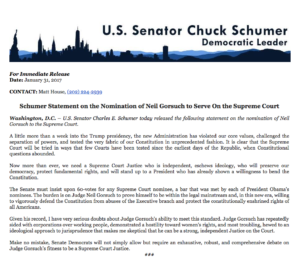Judge Neil Gorsuch’s Record Raises Serious Concerns
Can He Be Independent From Trump?
- Judge Gorsuch lacks a record of demonstrating independence and has made his right-wing political views known, expressing disdain for “the Left.”
o He has criticized “liberals” for turning to the courts to advance policy.
o He has shown disdain for the use of the courtroom to vindicate fundamental rights—a viewpoint that should be anathema to anyone in the legal system, but is particularly inappropriate for someone who seeks a seat on the highest court in the land.
o On money in politics, he is in the same company as Justices Thomas and Scalia, having expressed extreme skepticism to the most basic campaign finance rules.
Will He Continue To Favor Corporations Over People?
- Judge Gorsuch has consistently favored corporate interests over the rights of working people, siding with insurance companies denying disability benefits and employers discriminating against employees.
o He repeatedly sided with insurance companies who wanted to deny disability benefits to employees.
o In employment discrimination cases, Bloomberg found he has sided with employers 66% of the time (8 out of 12 cases); in one of the few cases he sided with an employee, it was a Republican woman who alleged she was fired for being a conservative.
o He wrote in an article in 2005 that securities class actions were just tools for plaintiffs’ lawyers to get ‘free ride[s] to fast riches.’
Will He Continue To Be Hostile Toward Women’s Rights?
- Gorsuch has been hostile to the rights of women, particularly with respect to their reproductive rights and health. His record is particularly disturbing given President Trump’s repeated promise that he would only appoint someone who would overturn Roe v. Wade.
o He was further to the right than the SCOTUS majority opinion in the Hobby Lobby case, writing to support an individual employer’s right to not provide healthcare to a woman because how that woman would use her health plan was offensive to the employer’s religion.
o He dissented from a ruling granting Planned Parenthood a preliminary injunction to stop the Governor of Utah from blocking their funding in the wake of the undercover videos.
Guidance on Supreme Court Nomination
The Senate has a Constitutional duty to advise and consent on the Supreme Court.
- The decisions that the Supreme Court makes impact the lives of every man, woman, and child in America.
- That’s why the United States Senate has a solemn, Constitutional duty to both advise and consent on a President’s nomination to the Supreme Court.
- Senate Democrats will uphold our Constitutional duty by thoroughly examining the nominee’s record and his or her qualifications.
The Senate’s role in vetting a Supreme Court nominee is more important now than ever.
- Only after a few days of the Trump presidency, the new Administration has tested our Constitution and the separation of powers in an unprecedented fashion.
- Now, more than ever, we need an independent judiciary committed to defending the Constitution and the rule of law.
The Senate must continue to require a 60 vote threshold for any Supreme Court nominee, just as it did for each of President Obama’s nominees.
- Each of President Obama’s nominees to the Supreme Court were mainstream judges who garnered bipartisan support in the Senate.
The Senate must have a serious, robust debate on President Trump’s nominee to the Supreme Court.
- Senators need adequate time to consider this choice, especially given the President’s repeated promises that he will nominate a Justice to advance a far-right, pro-corporate agenda.
- A robust debate means:
o Adequate hearings where the Senate Judiciary Committee can ask unlimited questions of the nominee
o All Senators receive a meeting
o All Senators can ask questions and get them answered by the nominee
Alexandria Phillips
Director of Surrogates and Media Affairs
Senate Democratic Leader Chuck Schumer
(c) 202-680-0427 @alexandria_gp


